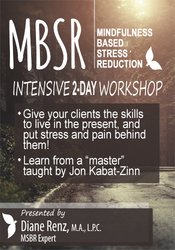

A note from your speaker
If you are reading this, I know you are interested in healing.
As a clinician, you know that exploring the various treatment modalities to facilitate that healing upholds the rigor of our profession.
For me, it became very clear that over many decades of that same pursuit, that the symptoms presented by my clients could become their ally - if they learned how to relate to them differently.
Whether the problem is stress, anxiety, depression, grief, trauma, or catastrophic illness, that presenting problem is the gateway to healing. It is dependent upon the quality of awareness and relationship applied to the perceived ‘problem’. Hence, my life’s work is creating conducive environments for the health of individuals. Mindfulness, and specifically the original template for mindfulness based interventions, MBSR, is teaching clients how to access their innate ability for healing through a new kind of awareness.
Join me in this restorative workshop to learn the original template for healing as developed by Jon Kabat-Zinn, Ph.D., leave with the tools that will transform your clinical practice – and help you with your own stress and burnout.
Here's to healing,
Diane
This online program is worth 13.0 hours CPD.
| File type | File name | Number of pages | |
|---|---|---|---|
| Manual ZNM052175 (10.95 MB) | 132 Pages | Available after Purchase |
Diane Renz, MA, LPC, has 37 years of Mindfulness experience, trained with Jon Kabat-Zinn & Saki Santorelli at the Center for Mindfulness, UMASS.
Diane is a Neuroscience Practical Applications Facilitator, Licensed Psychotherapist, Workshop Developer, Mindfulness Instructor & MBSR Teacher, who founded Your Gateway to Healing™, a worldwide counseling, coaching, and consulting service.
Utilizing the latest neuroscience studies that show our capacity for changing our brains & biology through focused attention, she presents a variety of somatic and mindfulness based practices to help people affect positive state & behavioral changes, that are detailed in her upcoming book on anxiety, based on her current trademarked workshop, “Healing Beyond Anxiety™: Body as Ally.”
With over 30 years in human services, trained in Transpersonal & Contemplative Psychology, philosophy, religious perspectives, as well as, extensive post graduate studies in Trauma and Somatic psychology, her work is a confluence of various schools of thought and personal experiment, and is fueled both by professional training and personal exploration.
She has studied with Dan Siegel, MD, in the field of neuroscience and Interpersonal Neurobiology, Jon Kabat Zinn in Mindfulness Based Stress Reduction, and integrates the teachings of numerous other thought leaders in the field of Somatic research and Neuroplasticity. Diane’s view of a person’s inherent health guides her work; each symptom becomes opportunity for healing. Both her professional and personal experience has proven that you can turn ‘pain into possibility™’ as it becomes your Gateway to Healing™.
Speaker Disclosure:
Financial: Diane Renz is the Founder of Your Gateway to Healing™. She receives a speaking honorarium from PESI, Inc. She has no relevant financial relationships with ineligible organizations.
Non-financial: Diane Renz is a member of UMASS Center of Mindfulness.
| 5 |
|
| 4 |
|
| 3 |
|
| 2 |
|
| 1 |
|
Satisfaction Guarantee
Your satisfaction is our goal and our guarantee. Concerns should be addressed to info@pesi.co.uk or call 01235847393.
Please wait ...